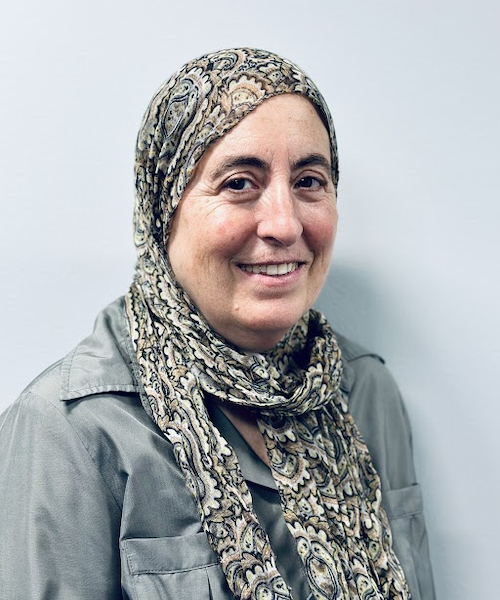One of the most beautiful sounds you will ever hear is an Islamic call to prayer, or Adhan, made by a muezzin, someone designated to vocalize out loud this invitation to gather and worship in congregation. Add to that a beautiful space with a high ceiling and unbelievable acoustics, overlayered with indoor overlapping sky bridges where many muezzins from different country traditions call the call to prayer in harmony and round. That was the opening of the seasonal iftar held each year at the United States Institute of Peace (USIP). This was an event co-hosted with Islamic Relief USA and attended by embassies, other NGOs, and government officials to break bread together—both to celebrate and to remember those who are food insecure when there is ample.
Islamic Relief USA (IRUSA) has had a long and rich history of interaction with the strategic religious engagement (SRE) initiatives and faith offices of the U.S. government and quasi-governmental institutions, like USIP, for nearly two decades. From joining in workshops on topics from halal foods with the U.S. Department of Agriculture (USDA) and collaborating on peacemaking toolkits with USIP, to speaking on various panels and co-hosting iftars—not only at USIP, but USDA and the U.S. Agency for International Development (USAID) over the years—our presence was part of that “missing dimension” of less heard voices. While sometimes tokenized in these spaces, IRUSA continued to nurture those relationships to bring value and an Islamic lens to the conversations taking place.
Islamic Relief USA was a proud partner working with the U.S. government following the inception of the faith-based offices under President George W. Bush, and this continued during all ensuing administrations of both parties. The faith-based initiative recognized, as stated on its website, that “Faith-based and community organizations (FBCOs) have a long tradition of helping Americans in need and together represent an integral part of our nation’s social service network.” Its aim was to expand and strengthen the work already being done.
One of my favorite examples of such a partnership was for behavior change messaging during the pandemic when IRUSA worked closely with the faith office at Health and Human Services (HHS) to become a national partner to receive masks and other hygiene products. We then distributed these items across the country to local community and faith partners that we were already supporting with our financial and technical aid well before the pandemic. Now we are adding trusted safety messaging about how to limit contact and interaction during holidays such as Ramadan and the two highly holy Eid days. The HHS faith office also participated in our annual Day of Dignity events that we hold nationally in the summer and fall months in metropolitan cities to address homelessness, and HHS would set up health check stations. We would sometimes even offer flu shots to these most vulnerable people living on the streets or in shelters as we were giving out warm jackets, school supplies, haircuts, and warm meals.
However, it was the USDA who was our most reliable engagement partner, consistently working with us year in and year out. Secretaries from virtually all administrations would often come and sit with us, again under both Republicans and Democrats alike, demonstrating how issues like global and domestic hunger cut across partisan stripes and acknowledging that faith actors were already feeding their hungry neighbors. Here, rather than being tokenized, we participated as experts on panels or helped to gather our Muslim local national diaspora grantees and partners to come to the nation’s capitol to also share their experiences working with vulnerable communities on the ground and sharing what worked or didn’t work with USDA officials who listened intently.
Some of IRUSA’s last tangible engagements in the SRE space were with the Biden administration’s White House Office of Faith-Based and Neighborhood Partnerships on its “U.S. National Strategy to Counter Islamophobia and Anti-Arab Hate,” developed with the backdrop of rising disinformation in the U.S. during an election year. This initiative dovetailed somewhat with the launch activities of USAID’s SRE policy. The goal behind these efforts was to capture what was working and the importance of engaging faith actors and faith-based organizations who are trusted community partners involved in enhancing some of the U.S. government priorities.
Recently I had to visit the Ronald Reagan Building in Washington, DC, for an appointment and was deflated to see the now-empty offices of USAID. The building directories had duct tape over the name of this former agency that contributed to a mission reflective of ours: “to partner to end extreme poverty and to promote resilient societies.” It will now become even more incumbent on faith-based organizations like IRUSA to pick up the mantle in some very complex country contexts to continue to respond to disasters, whether natural or man-made, and to bridge that nexus into sustainable development.
In conclusion, faith-based groups both in the past and present are still doing the work that needs to be done in both visible and quiet ways all across the country and the world. Proof of it can be seen everywhere from the mosques to the Muslim civil society organizations and the community volunteers rolling up their sleeves. Of course, the reality is the need doesn’t stop, but we cannot replace the promise of government to its own citizenry: all actors are needed to bring about safety, security, and prosperity to all. We need to stop questioning the motives of those entrenched in communities just because they wear a hijab head covering or sport a beard, and also ensure that empathy to neighbors of all stripes regardless of race, religion, political affiliation remains a virtuous value in America. Most of all, we must not silence the muezzins who call us to prayer, and call us to this work as part of the Islamic faith.

